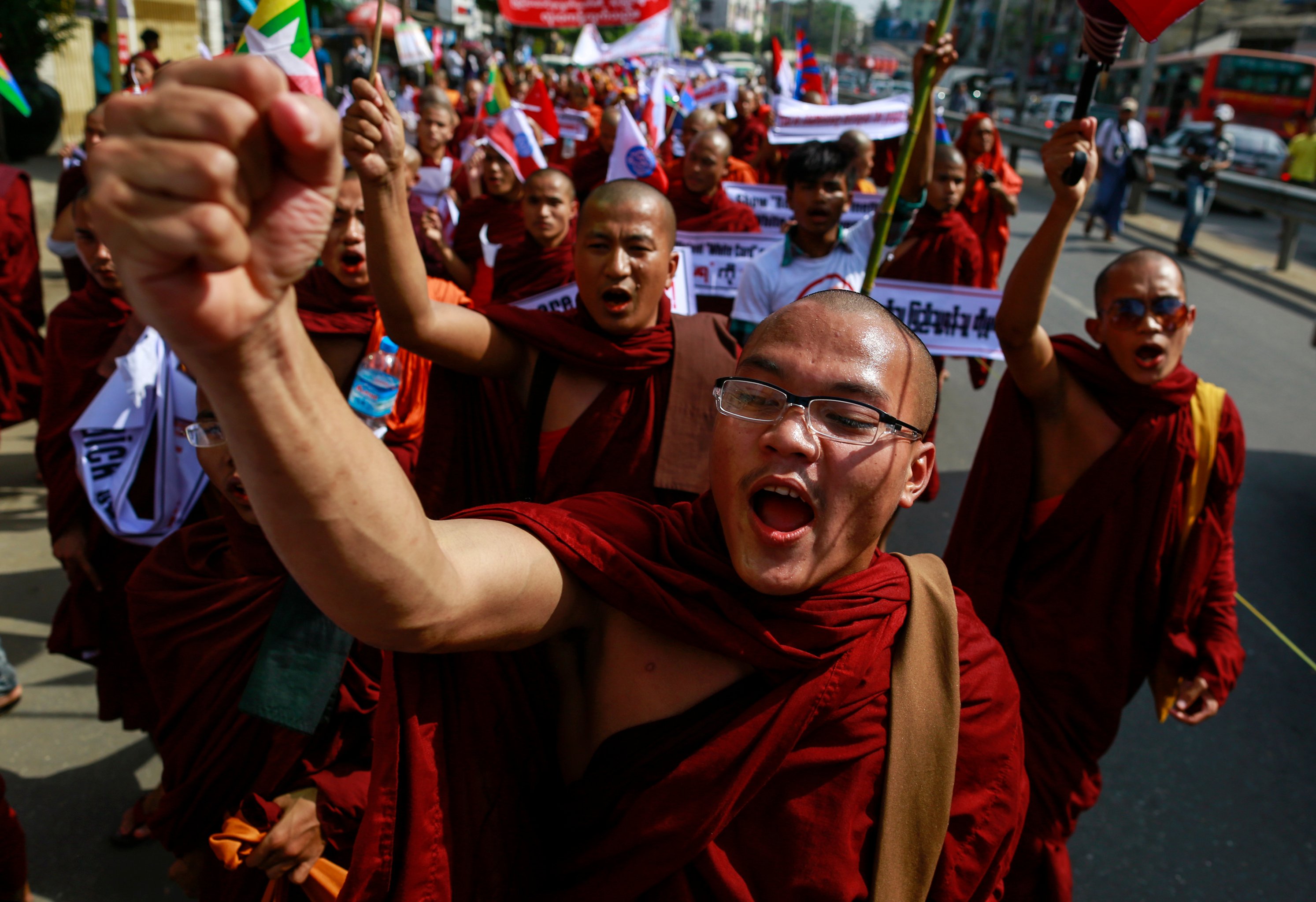
Buddhist Monks and Just War
พระมหาสมบูรณ์ วุฑฺฒิกโร (พรรณา)
PhramahaSomboonVuddhikaro (Phanna)
บทคัดย่อ
งานวิจัยเรื่องนี้เป็นการเชิงเอกสาร โดยมีวัตถุประสงค์การวิจัย 3 ข้อ คือ (1) เพื่อศึกษาแนวคิดเกี่ยวกับสงครามที่ยุติธรรมโดยทั่วไปและสงครามที่ยุติธรรมในทัศนะของพระพุทธศาสนา (2) เพื่อศึกษาบทบาทของพระสงฆ์กับสงครามที่ยุติธรรมในประวัติศาสตร์พระพุทธศาสนา และ (3)เพื่อหาข้อสรุปว่าการเกี่ยวข้อง
กับสงครามที่ยุติธรรมของพระสงฆ์สอดคล้องกับหลักพระพุทธศาสนาหรือไม่
จากการศึกษาได้ พบว่า แนวคิดเรื่องสงครามที่ยุติธรรมได้รับการพัฒนาอย่างต่อเนื่องในสังคมตะวันตก ตั้งแต่ยุคกรีกโบราณแล้วได้รับการพัฒนาต่อมาในยุคกลางของยุโรปโดยนักคิดชาวโรมันและนักบุญชาวคริสต์จนถึงยุคปัจจุบัน หัวใจสําคัญของสงครามที่ยุติธรรมนั้นคือ (๑) มีความถูกต้องชอบธรรมในการเข้าสู่สงคราม (jus ad bellum) และ (๒) มีความถูกต้องชอบธรรมขณะอยู่ในสงคราม (jus in bello) หลักการโดยรวมของพระพุทธศาสนายุคต้นไม่สนับสนุนการทําสงครามที่ยุติธรรม นอกจากไม่สนับสนุนแล้วยังถือว่าการใช้ความรุนแรงต่อเพื่อนมนุษย์เป็นการผิดศีลและเป็นบาปด้วย กล่าวเฉพาะพระสงฆ์ในสมัยพุทธกาล จากการศึกษาได้พบว่าพระพุทธเจ้าไม่ทรงสนับสนุนให้พระสงฆ์ใช้ความรุนแรง นอกจากไม่ทรงสนับสนุนแล้ว ยังทรงเข้าไปมีส่วนร่วมในการเจรจาไกล่เกลี่ยให้ยุติสงครามด้วย
ในพระพุทธศาสนาเถรวาทมีคัมภีร์เล่มหนึ่งชื่อว่า “มหาวงศ์” ซึ่งมีเนื้อหาเข้าข่ายส่งเสริมเรื่องสงครามที่ยุติธรรม โดยเสนอว่าการทําสงครามกับศัตรูผู้รุกราน ถือว่าเป็นบาปเหมือนกัน แต่บาปน้อย เพราะผู้ทําสงครามมีเจตนาที่จะปกป้องประเทศชาติ พระศาสนา และประชาชน และเพราะศัตรูผู้รุกรานนั้นเป็นคนมีคุณธรรมน้อย สําหรับในพระพุทธศาสนามหายาน หลักฐานในคัมภีร์ที่เข้าข่ายส่งเสริมการทําสงครามที่ยุติธรรม คือ มหาปรินิรวาณสูตร และอุปายเกาศัลยสูตร ทั้งสองพระสูตรนี้อนุญาตให้ชาวพุทธสามารถใช้ความรุนแรงได้ถ้าหากมีความจําเป็นต้องปกป้องพระสัทธรรมและผู้บริสุทธิ์ให้รอดพ้นจากการกระทําของคนชั่ว
อย่างไรก็ตาม ในประวัติศาสตร์ของพระพุทธศาสนาเถรวาทและมหายานยุคหลังพุทธกาล โดยเฉพาะอย่างยิ่งในสถานการณ์ที่ประเทศถูกศัตรูรุกราน มักจะมีพระสงฆ์จํานวนหนึ่งเข้าไปเกี่ยวข้องกับสงครามในรูปแบบต่างๆ ทั้งโดยตรงและโดยอ้อม การเกี่ยวข้องกับสงครามของพระสงฆ์ดังกล่าวนี้ ถือว่าไม่สอดคล้องกับหลักการในพระพุทธศาสนายุคต้น อย่างไรก็ตาม หากมองการกระทําของพระสงฆ์เหล่านั้นในสถานการณ์ที่บ้านเมืองกําลังตกอยู่ในภาวะสงครามเป็นไปได้ว่า พระสงฆ์เหล่านั้นอาจกําลังเผชิญสถานการณ์ที่ยากลําบากซึ่งจะต้องเลือก (dilemma) ระหว่างการปฏิบัติตามพระธรรมวินัยอย่างเคร่งครัด กับ การยอมละเมิดพระธรรมวินัยบางข้อเพื่อปกป้องบ้านเมืองและพระศาสนาให้รอดพ้นจากภัยสงครามก็ได้
Abstract
This research is a documentary one with three objectives: (1) to study the concept of just war in general and in Buddhist perspective, (2) to study Buddhist monks and just war in the history of Buddhism and (3) to find whether or not the participation of Buddhist monks in just war is in compliance with Buddhist principles.
The concept of just war originated in ancient Greece, then has been further developed in medieval Europe by Christian saints and Roman thinkers to the present. The hearts of just war are: (1) the right to go to war (jus ad bellum) and (2) the right to conduct in war (jus in bello).
In general, Early Buddhism does not support just war and also holds thatthe use of violence against human beings is considered as evil and wrong action. For Buddhist monks, they are prohibited by the Vinaya to go to see, to stay in, and to walk around in the army. The Buddha himselfnot only delivered the teachings on loving-kindness, compassion, non-violence, and no-killing but also participated in mediation to end the war.
In Theravada Buddhism, there is a scripture named “Mahavamsa” that can be interpreted to justify just war. And also in Mahayana Buddhism, there are some statements in two Mahayana sutras: Mahaparinirvana Sutra and Upayakausalya Sutra that can be interpreted to justify just war. According to both sutras, Buddhists can use violence or even just war if necessary to protect the Dhammaand the publicfrom the acts of the wicked.
However, throughout the history of both Theravada and Mahayana Buddhism in different countries, especially when their nations were invaded by the enemy, there were some groups of Buddhist monks involved in war, both directly and indirectly. Their involvements can be considered as against the Buddha’s teachings. However, it is possible that those monks were facing an ethical dilemma between to follow the Disciplines and the Doctrines strictly and to protect the country, religion, and people from the enemy.